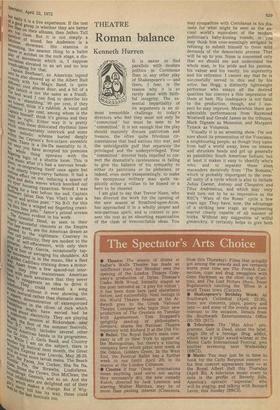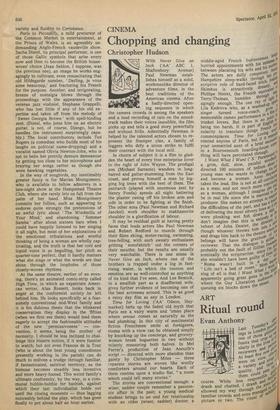THEATRE
Roman balance
Kenneth Hurren
It is easier to find parallels with modern politics in Corioianus than in any other play of Shakespeare's — and there, I fear, is the reason why it is so rarely done with faithful integrity. The essential impartiality of its arguments is an almost irresistible challenge to today's directors who feel they must not only be 'committed' but must be seen to be 'committed.' It is not enough that the play should maturely discuss patriotism and treason, the often quite frivolous circumstances that lead nations into war, and the unbridgeable gulf that separatesthe privileged and the underprivileged. Your committed ' director feels impelled to correct the dramatist's carelessness in failing to give the balance of his sympathy to either its patricians or its plebeians, or indeed, even more exasperatingly, to make its eponymous military man quite explicitly either a villian to be hissed or a hero to be cheered.
I am glad to say that Trevor Nunn, who has directed the work for the opening of the new season at Stratford-upon-Avon, has approached it in a wholly proper and non-partisan spirit, and is content to present the text as an absorbing examination of the clash of irreconcilable ideas. You may sympathise with Coriolanus in his distaste for what might be seen as the ancient world's equivalent of the modern politician's baby-kissing rounds; or you may think him over-weeningly arrogant in refusing to submit himself to these mild demands of the democratic process. That will be up to you. Nunn is concerned only that we should see and understand the whole man, in his pride and his passion, his valour and his vanity, his superiority and his reticence. I cannot say that he is successfully served to this end by his actor, Ian Hogg, a distinctly lightweight performer who essays all the desired qualities but conveys a thin impression of them at best. His inadequacy is not fatal to the production, though, and I suspect he may improve. Meanwhile there are admirable performances from Raymond Westwell and Gerald James as the tribunes, Mark Dignam as Menenius, and Margaret Tyzack as Volumnia.
Visually it is an arresting show. I'm not sure about its presentation of the Volscians, a neighbouring people, as though they came from half a world away, keen on totems and shrunken heads and got up generally as paleolithic South American Indians; but at least it makes it easy to identify who's who, and to separate these alien marauders decisively from The Romans,' which is probably importgant to the overall unity of a cycle which is also to include Julius Caesar, Antony and Cleopatra and Titus Andronicus, and which may very well turn out to be as impressive as the RSC's 'Wars of the Roses' cycle a few years ago. They have, now, the advantage of a striking new stage, an engineering marvel clearly capable of all manner of tricks. Without any suggestion of wilful gimmickry, it certainly helps to give both variety and fluidity to Corioianus. Paris to Piccadilly, a mild precursor of the Common Market in entertainment, at the Prince of Wales, is an agreeably undemanding Anglo-French vaudeville show. Sacha Distel, its principal performer, is one of those Gallic symbols that arise every now and then to become the British housewives' choice (Jean Sablon, I suppose, was the previous one), an image he works engagingly to cultivate, even resuscitating that old Hildegarde number, 'Darling, je vous aime beaucoup,' and fracturing his French for the purpose. Another, and invigorating, breeze of nostalgia blows through the proceedings with the appearance of the veteran jazz violinist, Stephane Grappelli, who has lost little if any of his old expertise and takes off from the melody of 'Sweet Georgia Brown' with spell-binding zest. (Distel, who joins him on an electric guitar, is not, of course, Django, but he handles the instrument surprisingly capably.) The local contributors include Ted Rogers (a comedian who builds most of his laughs on political name-dropping) and a vocalist named Olivia Newton-John, who is apt to belie her prettily demure demeanour by getting too close to her microphone and braying her songs rather as though she were hawking vegetables. In the way of songbirds, my inestimably greater fancy is for Marian Montgomery, who is available to fellow admirers in a late-night show at the Hampstead Theatre Club, where she rarely lets us fall from the palm of her hand. Miss Montgomery commits her follies, such as appearing to endorse quite strongly the pretensions of an awful lyric about 'The Windmills of Your Mind,' and abandoning 'Summer Samba' after about sixteen bars when I could have happily listened to her singing it all night, but most of her explorations of the emotional tribulations and wistful thinking of being a woman are wholly captivating, and the truth is that her cool and liquid voice is so beguiling, her pitch so quarter-tone perfect, that it hardly matters what she sings or what the words are that shine through the loopholes of those closely-woven rhythms. At the same theatre, earlier of an evening, there's an animated comic-strip called High Time, in which an expatriate American writer, Alan Rossett, looks back in anger at the conformist society he left behind him. He looks specifically at a fearsomely conventional mid-West family and it is his dubious thesis that the blinkered conservatism they display in the 'fifties (when we first see them) would lead them eagerly to accept the fashionable attitudes of the new 'permissiveness' — convention, it seems, being the mother of necessity. I should be less inclined to challenge this bizarre notion, if it were funnier to watch; but not even Frances de la Tour (who is about the best young comedienne presently working in the parish) can do Much to enliven a trudge through familiar, if fantasticated, satirical territory, as the humour becomes steadily less inventive and more heavy-footed. This weird family's ultimate conformity, by the way, is a communal hubble-bubble for hashish, against which their last individualist holds out until the closing moments — thus lagging noticeably behind the play, which has gone finally to pot about half an hour earlier.











































 Previous page
Previous page